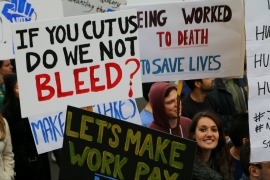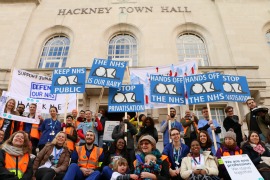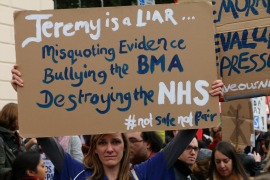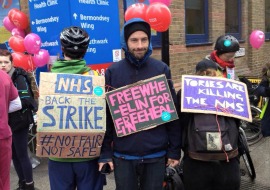Junior doctors’ struggle escalates as Tory desperation shows
March 4, 2016 12:00 am Leave your thoughts
So far this year, junior doctors – for the first time in over 40 years – have taken two days of industrial action in defence of their terms and conditions, and to defend the NHS against Tory cuts and privatisation.
Despite this mass resistance – and the wider support amongst the public towards the fight of the junior doctors – Jeremy Hunt, the Tory minister for health, has announced that the new contract will be nevertheless be imposed. This has only served to increase the anger of NHS staff towards the Tory government.
Further strike action has now been planned for March and April, as the battle to save the NHS intensifies and escalates. Dr Tomasz Pierscionek of the BMA North East Regional Council reports (in personal capacity) on the perspectives for the junior doctors’ struggle.
Public support
On the 10th February, Junior doctors throughout England took strike action for the second time in a month, providing only emergency cover for a period of 24 hours. An Ipsos MORI poll conducted at the time revealed that 64% of members of the public surveyed blamed the government for doctors taking industrial action whilst only 13% felt junior doctors were at fault.
Similarly to the January strike, doctors attended picket lines outside their local hospitals before interacting with members of the public at numerous ‘Meet the Doctors’ events across England to answer any questions members of the public might have relating to our industrial action and to gather signatures in support of our strike.
My local Meet the Doctors event took place on the busy Northumberland Street in Newcastle. Gathering signatures proved an easy task, as most people we encountered supported our walkout, with some urging us to “get rid of Hunt” .
In the days leading up to the second day of strike action, the government’s negotiators offered the BMA a final ‘take it or leave it’ offer.
Whereas this offer was an improvement on the contract originally proposed a few months earlier – demonstrating that organised, union-led action pays – concerns nevertheless remain that the new contract is still worse than the status quo.
In negotiations with the government in the days leading up to February’s industrial action, the BMA had put forward its own “fair and affordable” alternative which was rejected.
Contract imposition
 The day after the strike, it emerged that the aforementioned contract would be imposed on all junior doctors working within England, starting in August of this year.
The day after the strike, it emerged that the aforementioned contract would be imposed on all junior doctors working within England, starting in August of this year.
The suggestion of unilateral imposition has made medics even more furious. Everyone in the NHS knows that accepting Hunt’s contract would create a precedent that would embolden the Tories to proceed with unilaterally imposing unfavourable contracts on consultants, nurses and other healthcare professionals. The struggle of junior doctors, then, is only the first of many battles by health workers to defend the NHS.
Meanwhile, a petition pressing for parliament to consider a vote of no confidence in Hunt has, at the time of writing, gathered over 320,000 signatures.
In a further display that Hunt’s popularity is on the wane, he claimed to have support from the Chief Executives of 20 NHS hospital trusts, producing a letter that they had ostensibly signed. However, a short while later, 14 of these 20 signatories – whose alleged support Hunt brandished – distanced themselves from the letter stating that they did not actually agree with the imposition of the new contract upon doctors.
The aforementioned contract does have a caveat whereby NHS Foundation Trusts (about two-thirds of all NHS trusts) are under no obligation to impose it and are thus theoretically free to agree their own terms and conditions of employment. However, therein lies the rub: this could lead to a two tier system whereby a financially better off Foundation Trust could attract doctors away from its less prosperous counterparts, leading to an internal market and depriving poorer trusts of doctors.
In any case, Health Education England, a division within the Department of Health responsible for the training doctors in their respective specialties until they reach consultancy, informed Foundation Trusts that if they refuse to impose the new contract, their training programme budgets could be cut. An article in the Guardian plainly stated that,
“The threat comes in a letter from Health Education England, the Department of Health body responsible for education and training, to chief executives of NHS trusts in England. It states that decisions on awarding funding for training posts will hinge in part on whether a trust decided to rebel against Jeremy Hunt over the new national contract.”
Escalating action planned
 In the days following the 10th February strike, meetings organised by Regional Junior Doctors’ Committees (RJDC) took place across England in order to discuss what action should be taken in response to the DoH’s foisting of an unwanted contract upon medics, with a view to reporting back attendees’ thoughts to a national JDC meeting on the 20th February.
In the days following the 10th February strike, meetings organised by Regional Junior Doctors’ Committees (RJDC) took place across England in order to discuss what action should be taken in response to the DoH’s foisting of an unwanted contract upon medics, with a view to reporting back attendees’ thoughts to a national JDC meeting on the 20th February.
About seventy doctors, far more than typically attend regional BMA meetings, were present at a regional meeting in Newcastle engaging in a lively discussion for some hours.
The vast majority of us were in favour of further industrial action. The debate centred on what form such action should take and how long it should last, in the first instance. Most of those present agreed that industrial action needs to be escalated; to be prolonged and more effective.
In the wake of the national JDC meeting on the 20th February, plans for three more days of strike action were announced:
- 8am on Wednesday 9 March to 8am on Friday 11 March
- 8am on Wednesday 6 April to 8am on Friday 8 April
- 8am on Tuesday 26 April to 8am on Thursday 28 April
Over each of these 48-hour periods, junior doctors will offer emergency care only.
The sickly patient of capitalism
Industrial action may be disruptive to services; but the alternative of a situation where demoralised health professionals leave the NHS, and/or where the system becomes privatised, is far worse. It probably comes as no surprise that around seventy MPs, including Cameron and Hunt, are believed to have links with private healthcare companies.
Former Health Secretary Andrew Lansley, who fought hard to bring in the Health and Social Care Act (2012) (which makes it easier for private companies to bid for NHS contracts), now works with both a Swiss pharmaceuticals firm and is also an advisor to an American management consultancy which bids for NHS contracts.
This begs the question: how many Conservative Party MPs and their rich backers use the NHS? Such individuals are of course wealthy enough to afford private healthcare. One can see that, at best, they would be indifferent to the collapse of a public health service, and at worst might actively profit from the expansion of private healthcare.
In the final analysis, however, the attacks on the NHS are due neither to the personal interests and lifestyles of Tory cabinet ministers, nor to their ideological adoration of the market, but are the result of the crisis of capitalism, which demands austerity and cuts. As a major component of public spending, and with costly parts of the healthcare system actually under private control (such as the big pharma monopolies), the government is forced to attack the NHS and the junior doctors in order to sustain the only sickly patient that they care about: the capitalist system.
Tory lies
 The additional pressures working people are facing during this period of economic crisis is leading to a toll on both physical and mental health.
The additional pressures working people are facing during this period of economic crisis is leading to a toll on both physical and mental health.
Yet, paradoxically, when the health service is needed more than ever, the service and its staff face the onslaught of austerity. Hunt continues to echo the need for a “seven day” NHS service, without recognising that this already exists (albeit with a reduced number of staff on duty during weekends). If Hunt really wishes to maintain the same staffing levels across all seven days, he surely must realise that more – not less – money is required to fund such a venture.
In an article in The Independent, Johann Malawana, chair of the Junior Doctors Committee, concluded by stating: “Without any additional resources to indicate that more could be deliverable, this demonstrated how out of touch the government and its advisers had become. When so many doctors can see the problem and agree on the solution, you have to wonder what advice the government is listening to and whether that advice has fatally undermined the NHS, risking untold damage for generations to come.” One should also ponder how the Transatlantic Trade and Investment Partnership (TTIP), which enshrines privatisation into its legislation, may affect the NHS.
Meanwhile, Hunt’s claim of an additional 6000 annual deaths due to the lack of “a proper seven day service” – one of the government key arguments for the need to alter junior doctors’ contracts – has been blown out of the water, and he stands accused of misrepresenting the data of a study published in the British Medical Journal. (Interestingly, the BBC reported that Hunt had access to the details of said study two months before it was published). Academics are amongst those who have questions Hunt’s interpretation of the study data. During Prime Minister’s Questions earlier this week, Labour leader Jeremy Corbyn stated: “This dispute with the junior doctors has been on the basis of misrepresented research about weekend mortality”. Furthermore, a leaked report from Hunt’s department indicated that there was no evidence increased staffing levels on weekends would actually reduce mortality amongst patients admitted during these days, removing a linchpin from Hunt’s argument that extra staff are needed. To add further insult to injury, the report also stated that if hospitals are to function on weekends, as they do Monday to Friday, an additional 11,000 staff (including doctors and nurses) would be required, in addition to an annual cost of £900 million .
The Tory health minister is surely aware of the facts, but nevertheless continues with this rhetoric in order to confuse the situation and throw dust into the eyes of the public. His lies amount to empty political propaganda.
As anyone who has ever worked in a hospital will tell you, doctors cannot do their jobs in isolation without the assistance of support staff, such as porters to take patients to the X-ray department, radiographers to perform these scans, or laboratory technicians to analyse blood samples. These individuals would likewise need to be present in greater numbers if Hunt’s wish to create a “seven day service” were to become a reality. Yet, ironically, Hunt’s actions are only serving to increase the number of doctors in Australian and New Zealand hospitals, as more are taking steps to escape the Tories’ plans by moving abroad.
Leave and escape; or stay and fight?
 There is an ongoing debate amongst some junior doctors in England about whether to leave and practice abroad or in other parts of the UK, or to stay and fight the contract imposition to the end. As difficult as it is to tell any colleague with a family and a mortgage that they should accept worse pay and conditions, as opposed to taking a better offer elsewhere, leaving the NHS only makes the government’s job of dismantling it easier. With fewer unionised doctors and further pressure upon those who remain, demoralisation amongst NHS staff would only increase. If junior doctors accept the Tories’ attacks, the nurses, midwives and other healthcare workers will be next in the firing line, and the publically funded health service will be pushed further towards the brink. This allows those in favour of privatisation extra ammunition for their cause.
There is an ongoing debate amongst some junior doctors in England about whether to leave and practice abroad or in other parts of the UK, or to stay and fight the contract imposition to the end. As difficult as it is to tell any colleague with a family and a mortgage that they should accept worse pay and conditions, as opposed to taking a better offer elsewhere, leaving the NHS only makes the government’s job of dismantling it easier. With fewer unionised doctors and further pressure upon those who remain, demoralisation amongst NHS staff would only increase. If junior doctors accept the Tories’ attacks, the nurses, midwives and other healthcare workers will be next in the firing line, and the publically funded health service will be pushed further towards the brink. This allows those in favour of privatisation extra ammunition for their cause.
The junior doctors’ struggle has shown that the Tories, the most reliable parliamentary representatives of the ruling class, are vulnerable to organised action. Now, along with the rest of the labour movement, we must support each other in the battles ahead, as part of a wider fight against the Tories, against austerity, and for a socialist alternative to the current economic system.
By showing a militant lead, the junior doctors’ fight could, in turn, become the spark that lights the flame of the entire labour movement, emboldening other workers and trade unions to take action against Cameron’s government of the rich. Combined with a strong voice from the Corbyn-led Labour Party, and armed with a bold socialist programme, this could be the beginnings of the mass movement that is needed to overthrow the Tory government and end austerity.
Learning through struggle
Junior doctors have little previous experience of striking, but we are rapidly and aptly learning how to undertake industrial action. Public support remains high. I was asked to speak at a rally in Gateshead last weekend, organised by the Public Services Alliance, and many people came up afterwards to thank me for speaking and to offer their support.
The fight is far from over, but we have shown that the Tories are not invincible. The fight for the future of the NHS will mostly likely increase in intensity as the government becomes more desperate. The Tories are rapidly losing popularity and credibility over their stance towards the NHS and the junior doctors, not to mention the fact that they are tearing themselves to pieces over the question of Europe. Meanwhile, we can expect a further backlash from the most backward sections of the media.
The BMA now needs to work more closely with our allies in other healthcare unions, such as Unison and Unite, as well as with the TUC in general. Some in the BMA leadership are resisting this, as our union has traditionally been deemed to be “apolitical” and is not affiliated to the TUC or any political party. However, we need to be clear about the nature and context of our struggle, and how this fits in relation to austerity, the future of the NHS, and the wider capitalist crisis.
Our struggle does not exist in isolation but is yet another reflection of the impasse of the system, which is now attacking all of the reforms won and gained through the struggles of previous generations. Attempting to fight whilst remaining apolitical will not make us immune from capitalism’s need for austerity. It is time to openly acknowledge, as increasingly more doctors are realising, that a militant, united, and political struggle is needed to save the NHS and to save society from the sickness of capitalism.
Tomasz Pierscionek is standing for election to the BMA National Council
Join the People’s Assembly national demonstration in support Health, Homes, Jobs, and Education on Saturday 16thApril in London.
This article first appeared at Socialist Appeal http://www.socialist.net/junior-doctors-struggle-escalates-as-tory-desperation-shows.htm
Categorised in: Article
This post was written by Tomasz Pierscionek
